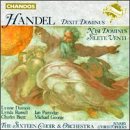| All Artists: Michael George, George Frederick Handel, Harry Christophers, Charles Brett, Sixteen Orchestra, Sally Dunkley, Nicola Jenkin, Lynne Dawson, Lynda Russell, Ian Partridge, Mark Padmore, Simon Birchall Title: Handel: Dixit Dominus; Nisi Dominus; Silete Venti Members Wishing: 1 Total Copies: 0 Label: Chandos Release Date: 7/29/1992 Genres: Pop, Classical Styles: Vocal Pop, Opera & Classical Vocal, Historical Periods, Baroque (c.1600-1750), Symphonies Number of Discs: 1 SwapaCD Credits: 1 UPC: 095115051726 |
Search - Michael George, George Frederick Handel, Harry Christophers :: Handel: Dixit Dominus; Nisi Dominus; Silete Venti
 | Michael George, George Frederick Handel, Harry Christophers Handel: Dixit Dominus; Nisi Dominus; Silete Venti Genres: Pop, Classical
|
Larger Image |
CD Details |
CD ReviewsSomewhat Puristical Recording with a Brilliant Lynne Dawson Leslie Richford | Selsingen, Lower Saxony | 11/02/2008 (4 out of 5 stars) "Georg Frideric Handel (1685 - 1759): Nisi Dominus. Silete Venti. Dixit Dominus. Performers: Lynne Dawson (soprano I); Lynda Russell (soprano II); Charles Brett (countertenor); Ian Partridge (tenor); Michael George (bass); The Sixteen Choir and Orchestra; dir. Harry Christophers. Recorded in St. Jude's Church, Central Square, London from 18th to 21st September, 1989. First published in 1991 as Chandos Chaconne 0517. Total playing time: 72'09".
The music: Nisi Dominus and Dixit Dominus are cantatas on psalm texts, composed during Handel's years in Italy - probably in 1707 for the Carmelite Vespers arranged with great pomp and expense in Rome by one of Handel's patrons. (If you would like to hear them in this context, then you should purchase Andrew Parrott's "Carmelite Vespers" on EMI/Virgin: Handel - Carmelite Vespers 1707 / Feldman · Kirkby · Van Evera · M. Cable · M. Nichols · Cornwell · Thomas · Parrott.) In the Nisi Dominus (a setting of the Latin text of Psalm 127: "Except the Lord build the house ...") there is an opening and a closing choral number, between which there are two tenor arias plus an aria each for the alto and the bass in which the young Handel rather operatically follows his wont of underlining the text with his music. The better-known "Dixit Dominus" (Psalm 110: "The Lord said unto my Lord") consists of nine numbers, six of which are sung by the choir. In addition, there is an alto and a soprano aria and a wonderful piece for two sopranos and choir. "Silete Venti" ("Be Silent, Ye Winds") belongs to a different period and a different category. It is a solo motet for soprano and orchestra on an anonymous, rather florid, pious text which Handel may have set to music during his stay in Venice in 1729. The essence of the piece is found in the opening Symphonia which glides over into the first soprano aria "Silete Venti" and in the 9 minutes long "Date serta", which, in its turn, leads to a lovely Hallelujah motive. The interpretation: As usual with Harry Christophers and the Sixteen, the performance is very "clean", in some places perhaps to the point of being "clinical". There are, nevertheless, a number of "peaks" (such as when Michael George begins his "Sicut sagittae in manu potentis" or in the "De torrente in via bibet" for two sopranos and choir towards the end of the Dixit Dominus). For me personally, however, it is clear that "Silete Venti" by far excels the other two pieces on the disc. Lynne Dawson, possibly the best female Handelian in the entire English early music scene, performs the whole motet with warmth, inner conviction and personal charm, and her vocal timbre, pure as a bell, magnificently complements Handel's typical strings-with-oboes orchestral sound. All the other soloists (only to be heard in the Nisi Dominus and the Dixit Dominus) are good, and that includes the soloists from the choir in their short moments of glory. The recording: Recorded in what is presumably quite a large church, the disc seems not to be so directly miked as many other Chandos jewels. The microphones are, in fact, placed relatively far away from what is happening, the voices of the soloists would possibly have benefitted from more volume, and the choir melts together in a way that makes it difficult to hear the individual voices - it seems that the sound of "the whole" is more important than detail. In comparison with a good studio recording, even the word "pale" came to mind - is that the price of "natural" sound? At any rate, listeners will be tempted to adjust the volume. The booklet: A short introduction by Simon Heighes (with rather questionable assumptions with regard to the origins of the psalm texts) is printed in English, French and German; the sung Latin texts are printed in full, also with translations into three languages. All the musicians involved are listed by name, and there are black-and-white photographs of the soloists (but not biographical information). Summa summarum: A very good, but perhaps somewhat puristical recording with slight deficits in the area of sound engineering. At all events, I prefer it to Andrew Parrott's recording of the Carmelite Vesper, which I thought was not a one hundred percent success, but I still would not want, at least as far as the "Dixist Dominus" is concerned, to do without John Eliot Gardiner's old Erato recording with the Monteverdi Choir." |

 Track Listings (20) - Disc #1
Track Listings (20) - Disc #1